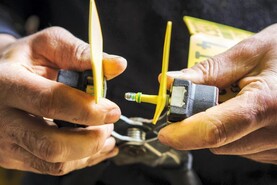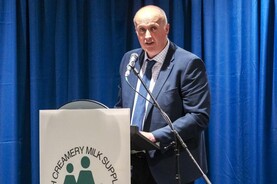IFA president Tim Cullinan has committed to working with a stable national herd, for now, in the context of Irish agriculture having to reduce emissions by between 21% and 30% by 2030.
When questioned on RTÉ’s Morning Ireland on Monday if a stable herd meant staying at 6.5m head, Cullinan said that a stable herd "means staying at this figure".
When asked if he would accept a cap on the dairy herd, Cullinan said Ireland is working on a stable herd at the moment.
“For now we will work with a stable herd but as the science evolves, and we see this in the pandemic, when all the scientists came together we got a solution within months which normally would take 10 years, it is the same what is happening with emissions from bovines I think with the science evolving.
“Maybe in the future we can look at a stable herd, number one, and bringing more efficiencies to the sector.”
He said that a stable herd “means staying at that figure” of 6.5m head but also “working with the advances around science to ensure we can do that and protect our sector into the future”.
Cullinan also said that “if you look at the last 20 years, the number of animals in the country is almost identical to 20 years ago”.
Cut in emissions
The IFA president said that farmers will accept a cut in emissions.
“What we’re looking at here is, the debate needs to be around reducing emissions, not reducing animal numbers. The average number per farm is 70 or 80 animals per farm.
“If we start cutting that our farmers become totally unviable, but what we have been doing, and quite clearly will do going forward, is work with the Government, sit down with the Government to reduce the emissions from farming,” he said.
Extremely difficult target
Cullinan said the 21% to 30% target to reduce emissions by 2030, will be extremely difficult for farmers to achieve but that it has to be looked at in context.
“We produce top quality food in this country, one of the most efficient areas in the world to do that. How do we do this? What we are looking at is, we have a MACC curve that has been developed by Teagasc and a number of measures in that that would help farmers in the way that they would manage their farms to reduce emissions from their farm.
“So farmers already have done a lot of work around this and will be working on it going forward. I suppose if we look at it, climate reduction on the general public it may impact on their lifestyle but climate reduction will impact on farmers’ livelihoods and incomes, so it’s very, very challenging for our sector,” he said.
IFA protests
At an IFA protest in Roscommon earlier this month, Cullinan said the IFA would fight the threat to cut cattle numbers in Ireland.
He said that a cut to the herd "won't happen on my watch".






 This is a subscriber-only article
This is a subscriber-only article











SHARING OPTIONS: